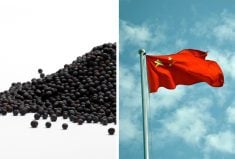WASHINGTON, D.C. — Canada’s livestock producers may be fighting an unwinnable war to overturn country-of-origin labelling in the United States, says the president of the U.S. National Farmers Union.
Instead of battling the contentious legislation, Canadian farmers should focus on branding their products and take advantage of the labelling law.
“Why don’t you just go put the Maple Leaf on your (meat) and sell it down here? I think it would be viewed very positively in the U.S,” said NFU president Roger Johnson.
Read Also

Canada, Mexico look beyond U.S. as agri-food trade pact expands
Earlier this week Heath MacDonald, Canada’s Minister of Agriculture and Agri-Food and Mexico’s Secretary of Agriculture and Rural Development, Julio Berdegué, met to discuss bilateral relations and strengthen cooperation and trade ties between the two countries.
“You can probably get premiums in lots of places by putting a Maple Leaf on a product.”
COOL requires labels on meat sold in U.S. stores to provide information on where the cattle, poultry and hogs were born, raised and slaughtered. Canada’s government, the Canadian Cattlemen’s Association and the Canadian Pork Council have contested the regulation since the U.S. proposed the legislation in the 2000s. Since its inception in 2009, Canada’s ag industry has said COOL causes price discounts for livestock, pork and beef exported to the U.S., leading to billions of dollars in losses for Canadian producers.
The Wall Street Journal reported in late August that the U.S. lost its WTO case before a compliance panel, looking at whether America’s revised country-of-origin labelling rules complied with an earlier WTO ruling.
Johnson isn’t willing to concede the U.S. has lost, or that the WTO panel will require drastic changes to COOL.
“We really need to see what the ruling is,” he said.
“Depending on what it is and what is says, maybe there’s an easy way to tweak things to come into compliance, and the issue goes away.”
As well, the WTO process allows for an appeal, which means the final ruling could be delayed for another year, he said.
The NFU, which represents 200,000 farm families in the U.S., has been a vocal and active proponent of COOL for many years.
In 2013, for instance, the organization issued 14 press releases in support of the legislation. Given the size of its membership, the NFU has influence in Washington.
In early September, nearly 300 NFU members traveled to Washington to meet with members of Congress, White House representatives and U.S. agriculture secretary Tom Vilsack to discuss a range of ag issues, including COOL.
Johnson said COOL is a “top of mind” issue for NFU members because U.S. farmers want a production system and value chain that inspires consumer confidence in meat.
“From the farmers and ranchers perspective … they’re really proud of what they do and they want (consumers) to know that they’re proud of their products,” he said inside the boardroom of the NFU office, a 10 minute walk from Capitol Hill.
While the trade and legal disputes generate headlines regarding COOL, Johnson said there is a much larger issue at play. American consumers want to know where and how their food is produced.
That movement will be hard to squelch.
“This powerful and growing desire on the part of consumers to know more and more about the food that they’re eating, that trend is unlikely to reverse itself,” he said. “The resistance to labelling is viewed by most consumer groups as an attempt to hide something.”
The NFU has taken advantage of those consumer expectations. It has said the meat packers want to kill COOL because the massive corporations oppose a transparent meat industry.
“The reason they (meat packers) want to get rid of this … it has very little to do with Canada-U.S., as much as it does imports of meat products from other places around the globe,” Johnson said. “They want to be able to blend products from different countries and market them at a higher value without telling consumers that they are blended products.”
Chandler Goule, NFU senior vice-president of programs, said the market for meat is increasingly segregated in the U.S., as more consumers want products like grass-fed beef and antibiotic-free meat.
As an example of how countries can benefit from COOL, Goule said sales of New Zealand lamb exploded in places like New York, San Francisco and Los Angeles after the regulations required a “product of New Zealand” label on the meat.
“They saw a huge increase in (their) sales…. Marketing your product down here with a Maple Leaf would get you a premium rather than trying to change our system.”
Looking ahead, Johnson said it might be easier for Canada’s livestock industry to work with COOL because eliminating or drastically changing legislation in the U.S. can be grueling.
Considering the political gridlock, Johnson said COOL may be here to stay.
“Some version of this is, I think.”















